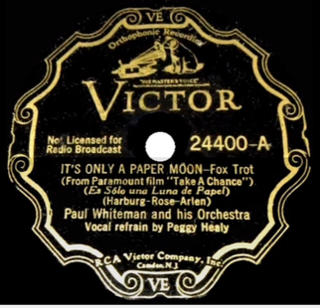Related Research Articles
"Lullaby of Broadway" is a popular song with music written by Harry Warren and lyrics by Al Dubin, published in 1935. The lyrics salute the nightlife of Broadway and its denizens, who "don't sleep tight until the dawn."
"Three Little Words" is a popular song with music by Harry Ruby and lyrics by Bert Kalmar, published in 1930.
"Oh, Lady Be Good!" is a 1924 song by George and Ira Gershwin. It was introduced by Walter Catlett in the Broadway musical Lady, Be Good! written by Guy Bolton, Fred Thompson, and the Gershwin brothers and starring Fred and Adele Astaire. The song was also performed by the chorus in the film Lady Be Good (1941), although the film is unrelated to the musical.
"P.S. I Love You" is a popular song with music by Gordon Jenkins and lyrics by Johnny Mercer. published in 1934.

"A Fine Romance" is a popular song composed by Jerome Kern with lyrics by Dorothy Fields, published in 1936.

"It's Only a Paper Moon" is a popular song published in 1933 with music by Harold Arlen and lyrics by Yip Harburg and Billy Rose.
"You're Getting to Be a Habit with Me" is a 1932 popular song with music by Harry Warren and the lyrics by Al Dubin, which became a standard. The lyrics of the song were noted for its references to addiction.
"Nice Work If You Can Get It" is a popular song and jazz standard composed by George Gershwin with lyrics by Ira Gershwin.
"It's Easy to Remember " is a popular song written by Richard Rodgers with lyrics by Lorenz Hart.
"South of the Border Down Mexico Way" is a popular song describing a trip to Mexico, written by Jimmy Kennedy and Michael Carr and published in 1939 for the film of the same name starring country star Gene Autry.
"Isn't It Romantic?" is a popular song and part of the Great American Songbook. The music was composed by Richard Rodgers, with lyrics by Lorenz Hart. It has a 32-bar chorus in A–B–A–C form. Alec Wilder, in his book American Popular Song: The Great Innovators 1900–1950, calls it "a perfect song."

"The Gold Diggers' Song " is a song from the 1933 Warner Bros. film Gold Diggers of 1933, sung in the opening sequence by Ginger Rogers and chorus. The entire song is never performed in the 1933 movie, though it introduces the film in the opening scene. Later in the movie, the tune is heard off stage in rehearsal as the director continues a discussion on camera about other matters.

Sabse Bada Rupaiya is a 1976 Indian Hindi-language film, produced by Mehmood and directed by S. Ramanathan.The film stars Mehmood, Vinod Mehra, Moushumi Chatterjee, Farida Jalal, Asit Sen, Agha, Keshto Mukherjee and Jeevan. The title song Sabse Bada Rupaiya is inspired by the music to the title song of the Hollywood musical 42nd Street (1933). The song was used again in an Abhishek Bachchan-starrer Bluffmaster (2005) in the opening credits. The core plot of the movie is based on the 1971 Kannada movie Kasidre Kailasa.
"The Lady's in Love with You" is a popular song which was written by Burton Lane (music) and by Frank Loesser (lyrics). The song was published in 1939 and introduced in the film "Some Like It Hot" (1939) when it was sung by Bob Hope and Shirley Ross. Ms Ross also sang it in the film with Gene Krupa and His Band. The song was sung by Tony Bennett at his final concerts, at Radio City Music Hall, in 2021.
"Top Hat, White Tie and Tails" is a popular song written by Irving Berlin for the 1935 film Top Hat, where it was introduced by Fred Astaire.
"Get Out of Town" is a 1938 popular song written by Cole Porter, for his musical Leave It to Me!, where it was introduced by Tamara Drasin.
"Old Devil Moon" is a popular song composed by Burton Lane with lyrics by Yip Harburg for the 1947 musical Finian's Rainbow. It was introduced by Ella Logan and Donald Richards in the Broadway show. The song takes its title from a phrase in "Fun to Be Fooled", a song that Harburg wrote with Harold Arlen and Ira Gershwin for the 1934 musical Life Begins at 8:40.
"Alone Together" is a song composed by Arthur Schwartz with lyrics by Howard Dietz. It was introduced in the Broadway musical Flying Colors in 1932 by Jean Sargent.
"Cow Cow Boogie (Cuma-Ti-Yi-Yi-Ay)" is a "country-boogie"-style blues song, with music was written by Don Raye, and lyrics were written by Benny Carter and Gene De Paul. The song was written for the 1942 Abbott & Costello film Ride 'Em Cowboy, which included Ella Fitzgerald as a cast member, but was cut from the movie.
"Love Is the Sweetest Thing" is a popular song written in 1932 by British band leader and singer Ray Noble. Using guest vocalist Al Bowlly, Noble's recording was a big hit on both sides of the Atlantic, bringing Noble his first American success. It was published by Francis, Day & Hunter Ltd. Like most compositions published in the period, its main refrain is preceded with what were then called "sectional verses" or "introductory verses" which are usually omitted from early recordings and modern performances.
References
- ↑ "42nd Street", Internet Broadway Database, accessed February 26, 2013
- ↑ Whitburn, Joel (1986). Joel Whitburn's Pop Memories 1890-1954 . Menomonee Falls, Wisconsin: Record Research Inc. p. 500. ISBN 0-89820-083-0.
- ↑ "The Online Discographical Project". 78discography.com. Retrieved January 12, 2019.
- ↑ "allmusic.com". allmusic.com. Retrieved January 12, 2019.
- ↑ "allmusic.com". allmusic.com. Retrieved January 12, 2019.
- ↑ "Various The Essential Guide To Bollywood CD". UnionSquareMusic.co.uk. 2008-06-23. Archived from the original on 2008-06-23. Retrieved 2012-07-11.
- ↑ Stewart, Gary (1998). Cleveland Rocks! Music from The Drew Carey Show (booklet). Rhino Records. 75342.